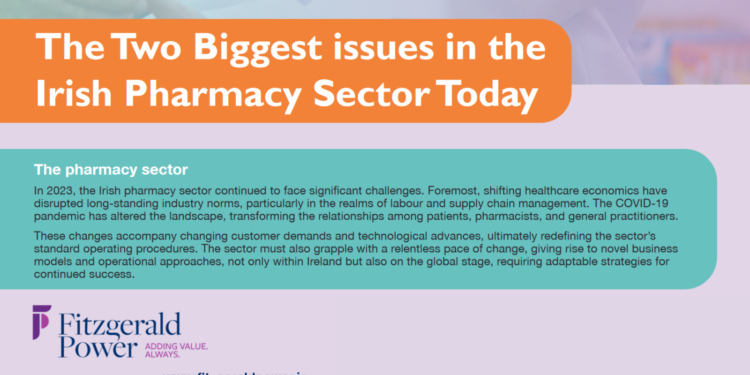The pharmacy sector
In 2023, the Irish pharmacy sector continued to face significant challenges. Foremost, shifting healthcare economics have disrupted long-standing industry norms, particularly in the realms of labour and supply chain management. The COVID-19 pandemic has altered the landscape, transforming the relationships among patients, pharmacists, and general practitioners. These changes accompany changing customer demands and technological advances, ultimately redefining the sector’s standard operating procedures. The sector must also grapple with a relentless pace of change, giving rise to novel business models and operational approaches, not only within Ireland but also on the global stage, requiring adaptable strategies for continued success.

Stuart Fitzgerald, CEO Fitzgerald Power
Revenue and item trends
Each quarter, Fitzgerald Power publishes our Pharmacy Pulse report, an analysis of the key trends in the Irish Community Pharmacy sector. In it, we discuss the current forces shaping the market, such as medicine shortages and labour cost inflation.
In our 2023 Q1 edition, we noted that the top five major OTC classes by value were: pain relief, respiratory, VMS and tonics, digestive, and skin treatment according to IQVIA. In Q1, RX sales were up 6% in value and 7% in volume compared to the same period last year.
Similarly, our Q2 edition reported that the top five major OTC classes remained unchanged in the second three months of the year, again according to IQVIA. In Q2, RX sales were up 6% in value and 5% in volume compared to the same period last year.
At the time of writing this article our Q3 Pharmacy Pulse report was being drafted. However, based on PSI data, we estimate the following opening and closures so far this year:
New Openings and Closures

The biggest issue in the market right now
As with last year, a lack of qualified pharmacists and wage inflation is still the most important issue in the pharmacy sector. The locum market continues to see relatively high wage costs which, when combined with a low supply of graduates working in the pharmacy sector, makes it difficult to recruit permanent staff. This shortage of pharmacists comes at a time when the demands on pharmacies have never been higher.
For this reason, the profile of pharmacists disposing of pharmacies continues getting younger. Anecdotally, we see labour resourcing and the impact on owner operator work-life balance as the number one reason that pharmacists are considering selling their businesses.
The second biggest issue in the market right now
Drug shortages and supply chain issues remain the second most important issue facing the sector. This is creating huge pressure on pharmacists to manage patient concerns at the community level.
Medicine shortages and reduced availability represent an increasing issue across the EU and the globe, giving rise to real fear among both medical professionals and patients alike. In efforts to tackle the on-going medicines shortages, the EU is preparing to stockpile drugs and oblige manufacturers to guarantee supplies. Earlier in the year, 212 products were out of stock, including cough syrups and vital antibiotics.
The suppliers of the majority of medicine in Ireland has urged the Government to heed warnings from GPs and pharmacists nationwide on the growing risk of medicines shortages. 60% of respondents to an Azure Pharmaceuticals poll answered they had been impacted by medicine shortages in the past year. It may have a significant impact on patient care by causing medicine rationing and the delay of critical treatments.



The Pharmacy team, Fitzgerald Power











